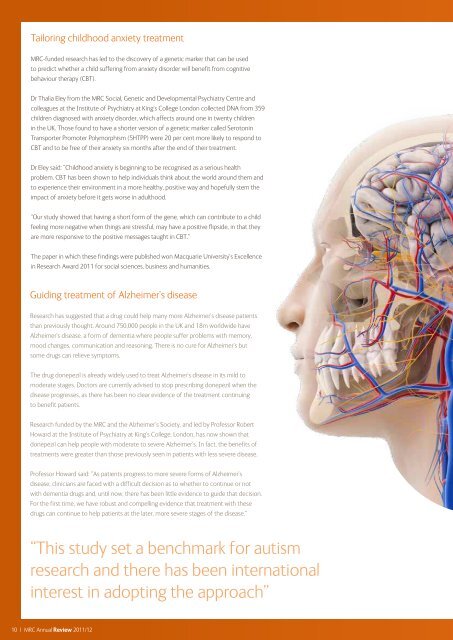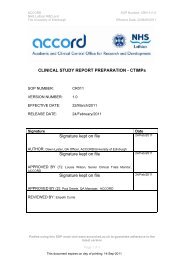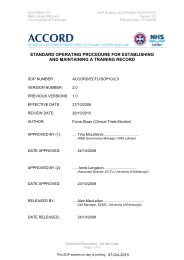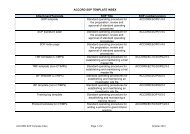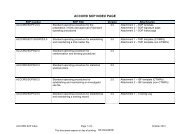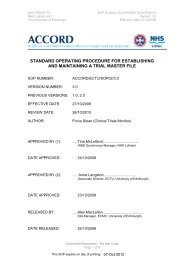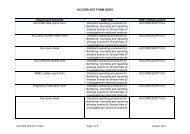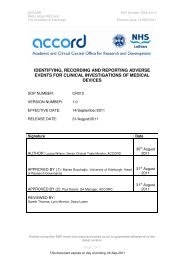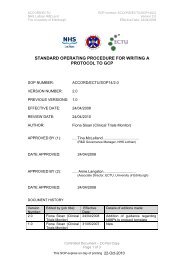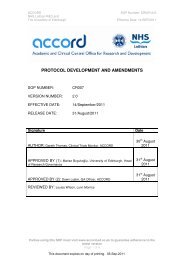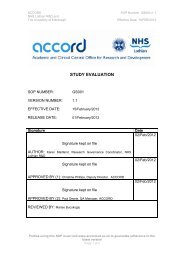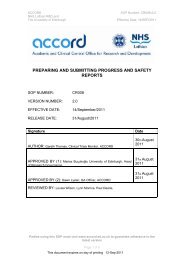Advancing medicine, changing lives - Medical Research Council
Advancing medicine, changing lives - Medical Research Council
Advancing medicine, changing lives - Medical Research Council
Create successful ePaper yourself
Turn your PDF publications into a flip-book with our unique Google optimized e-Paper software.
Tailoring childhood anxiety treatment<br />
MRC-funded research has led to the discovery of a genetic marker that can be used<br />
to predict whether a child suffering from anxiety disorder will benefit from cognitive<br />
behaviour therapy (CBT).<br />
Dr Thalia Eley from the MRC Social, Genetic and Developmental Psychiatry Centre and<br />
colleagues at the Institute of Psychiatry at King’s College London collected DNA from 359<br />
children diagnosed with anxiety disorder, which affects around one in twenty children<br />
in the UK. Those found to have a shorter version of a genetic marker called Serotonin<br />
Transporter Promoter Polymorphism (5HTPP) were 20 per cent more likely to respond to<br />
CBT and to be free of their anxiety six months after the end of their treatment.<br />
Dr Eley said: “Childhood anxiety is beginning to be recognised as a serious health<br />
problem. CBT has been shown to help individuals think about the world around them and<br />
to experience their environment in a more healthy, positive way and hopefully stem the<br />
impact of anxiety before it gets worse in adulthood.<br />
“Our study showed that having a short form of the gene, which can contribute to a child<br />
feeling more negative when things are stressful, may have a positive flipside, in that they<br />
are more responsive to the positive messages taught in CBT.”<br />
The paper in which these findings were published won Macquarie University’s Excellence<br />
in <strong>Research</strong> Award 2011 for social sciences, business and humanities.<br />
Guiding treatment of Alzheimer’s disease<br />
<strong>Research</strong> has suggested that a drug could help many more Alzheimer’s disease patients<br />
than previously thought. Around 750,000 people in the UK and 18m worldwide have<br />
Alzheimer’s disease, a form of dementia where people suffer problems with memory,<br />
mood changes, communication and reasoning. There is no cure for Alzheimer’s but<br />
some drugs can relieve symptoms.<br />
The drug donepezil is already widely used to treat Alzheimer’s disease in its mild to<br />
moderate stages. Doctors are currently advised to stop prescribing donepezil when the<br />
disease progresses, as there has been no clear evidence of the treatment continuing<br />
to benefit patients.<br />
<strong>Research</strong> funded by the MRC and the Alzheimer’s Society, and led by Professor Robert<br />
Howard at the Institute of Psychiatry at King’s College, London, has now shown that<br />
donepezil can help people with moderate to severe Alzheimer’s. In fact, the benefits of<br />
treatments were greater than those previously seen in patients with less severe disease.<br />
Professor Howard said: “As patients progress to more severe forms of Alzheimer’s<br />
disease, clinicians are faced with a difficult decision as to whether to continue or not<br />
with dementia drugs and, until now, there has been little evidence to guide that decision.<br />
For the first time, we have robust and compelling evidence that treatment with these<br />
drugs can continue to help patients at the later, more severe stages of the disease.”<br />
“This study set a benchmark for autism<br />
research and there has been international<br />
interest in adopting the approach”<br />
“These drugs can continue to help patients at the<br />
later, more severe stages of Alzheimer’s disease.”<br />
Helping autistic children communicate<br />
Children with autism find it hard to communicate socially. Parents often don’t know<br />
how to interact with an autistic baby who doesn’t make eye contact or learn to talk as<br />
healthy children do, and may be perplexed as to how to respond to their seemingly aloof<br />
behaviour. The child may become increasingly isolated from the world around them.<br />
Professor Jonathan Green and colleagues at the University of Manchester have come up<br />
with a way of helping parents communicate effectively with their autistic child. Using<br />
video feedback, parents are taught how autistic children communicate, and then how to<br />
re-establish enjoyable interactions with their children, such as looking at things together.<br />
As the child progresses, parents learn strategies to improve language development, for<br />
example using familiar repetitive language and action routines.<br />
An MRC-funded trial involving 152 autistic children showed that the technique was very<br />
successful in increasing effective communication between parent and child. Because<br />
the technique requires fewer sessions with a therapist, it is cost effective compared with<br />
conventional treatment and is now being adopted by services within the NHS.<br />
Professor Green says: “This study set a benchmark for autism research and there<br />
has been international interest in adopting the approach; with implementation now<br />
beginning in Asia. The next step will be to find ways to generalise the effect – to help<br />
autistic children’s social communication not only with their parents but also in the<br />
outside world.”<br />
Computerised programme for ‘brain re-hab’<br />
Cognitive Remediation Therapy (CRT) improves cognition (mental processing skills such<br />
as attention, memory and decision-making) and social functioning in patients diagnosed<br />
with schizophrenia, but because it relies on intensive interaction with a therapist, so far<br />
its use within the NHS has been limited.<br />
CRT works by setting patients different tasks that help improve their memory, planning<br />
skills and ability to switch their response according to context (cognitive flexibility). In<br />
a project funded through the MRC’s Developmental Pathway Funding Scheme, Dr Clare<br />
Reeder at King’s College London has been studying a computerised alternative to CRT<br />
known as CIRCuiTS to see if it is a viable, effective treatment option.<br />
Dr Reeder said: “Computerised CRT not only relieves pressure on the extremely limited<br />
access to therapists, but offers a package that is specifically designed for schizophrenia.<br />
CIRCuiTS is a new, graphically and functionally sophisticated computerised CRT<br />
programme which closely approximates ‘real life’ CRT. It’s driven by clear theoretical<br />
principles and relies on well-researched training techniques for schizophrenia. CIRCuiTS<br />
still relies on working with a therapist but it also allows patients to work independently,<br />
reducing the amount of contact they need to have with a therapist.”<br />
The software is now complete, but it still needs to be tested for feasibility and<br />
acceptability to patients and clinicians. The study will arm clinicians, therapists and<br />
researchers with the evidence to assess how CRT can be best implemented into<br />
schizophrenia patients’ wider course of treatment.<br />
10 | MRC Annual Review 2011/12 MRC Annual Review 2011/12 | 11


